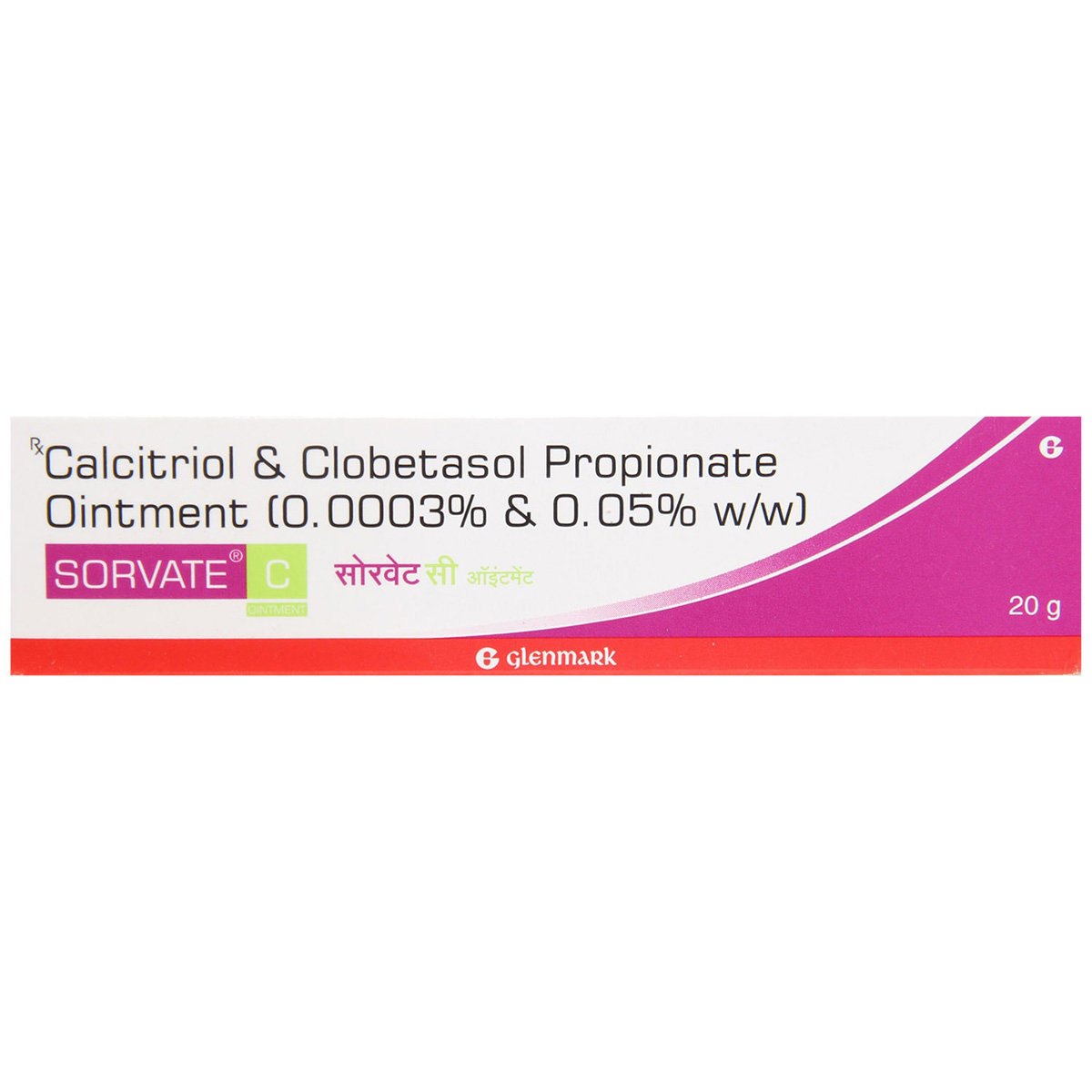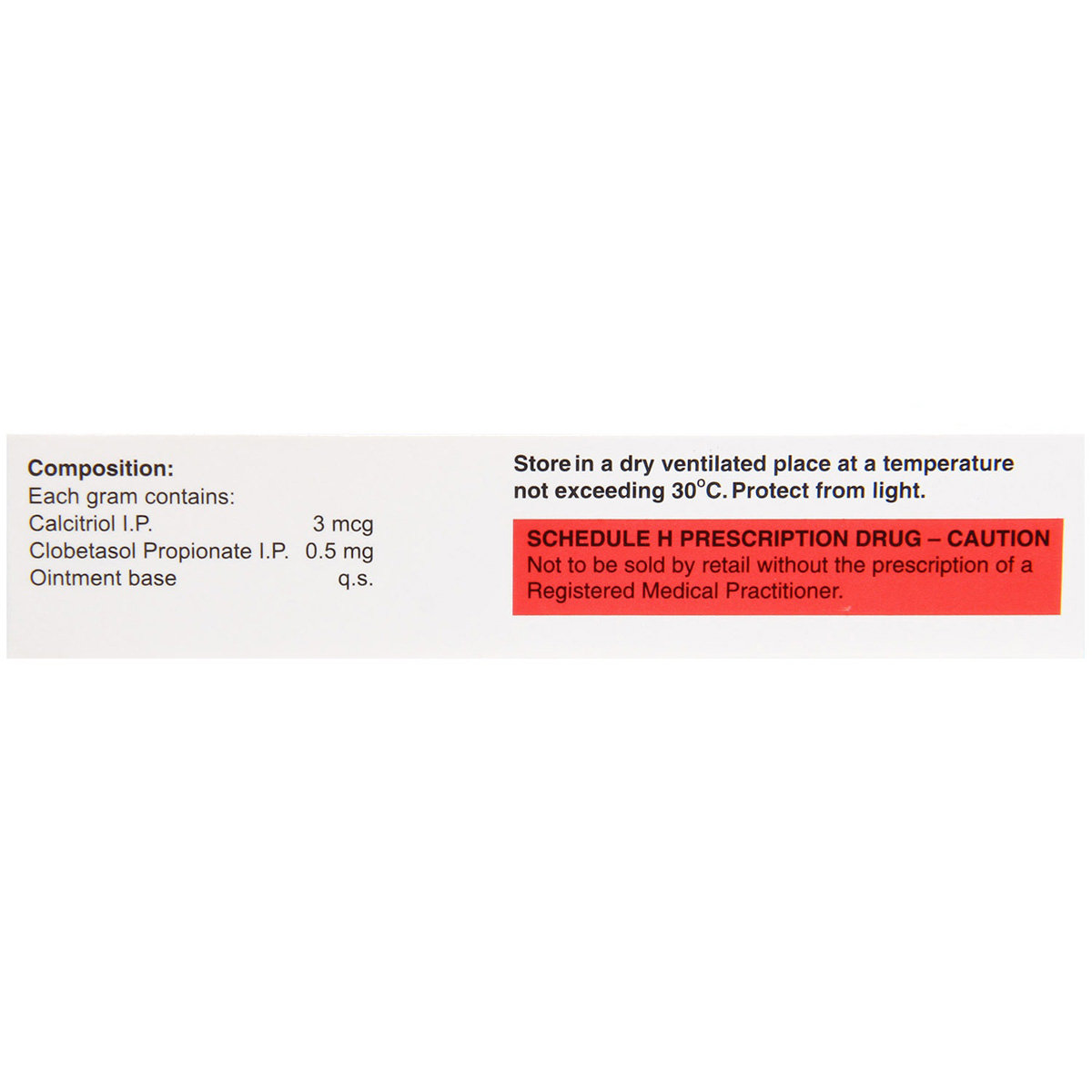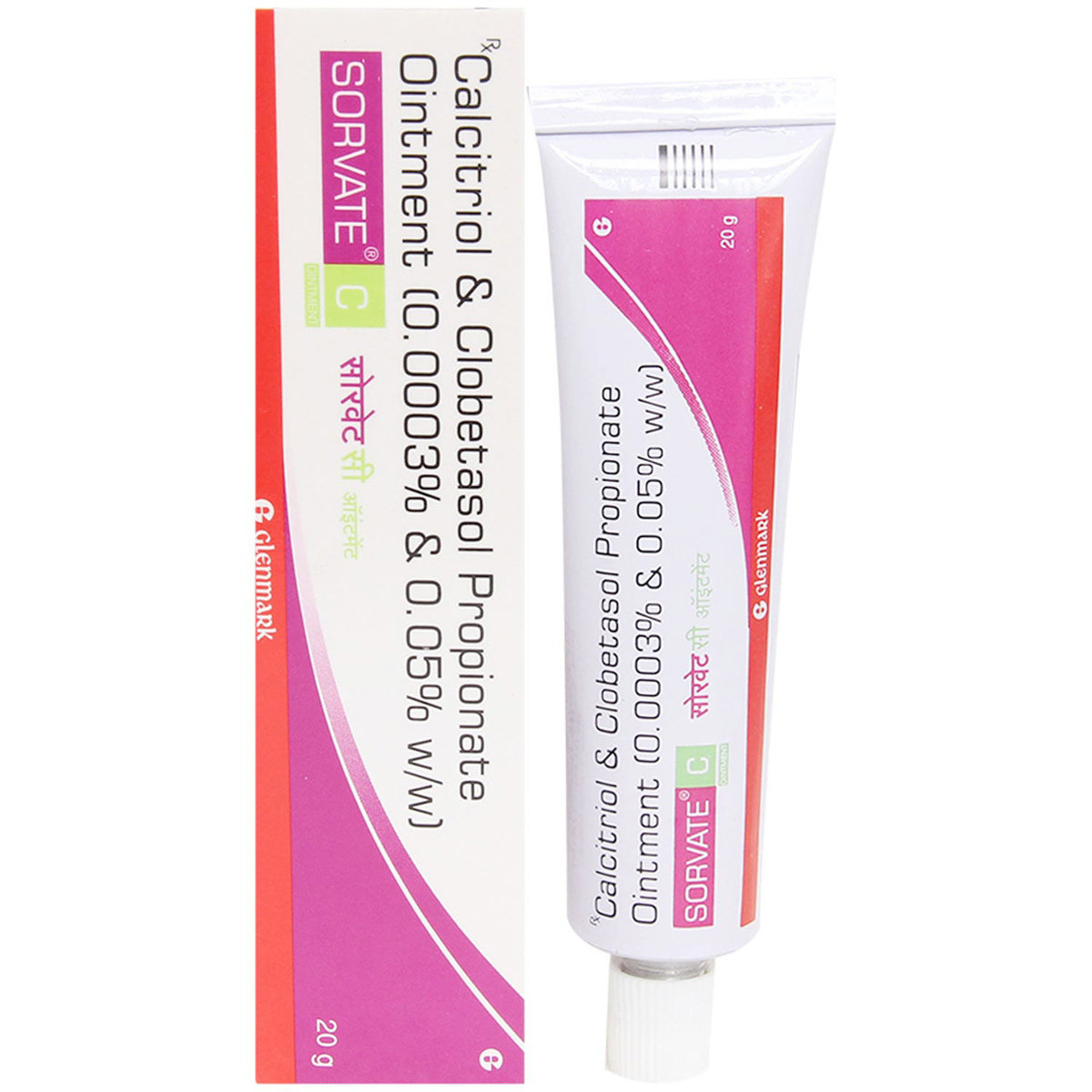Sorvate C Ointment 20 gm
MRP ₹515.5
(Inclusive of all Taxes)
₹77.3 Cashback (15%)
Selected Pack Size:20 gm
20 gm ₹464
(₹23.2 per gm)
In Stock
15 gm ₹464
(₹30.93 per gm)
In Stock
Provide Delivery Location
Online payment accepted
 Prescription drug
Prescription drugWhats That
Composition :
Manufacturer/Marketer :
Consume Type :
Expires on or after :
Return Policy :
About Sorvate C Ointment
Sorvate C Ointment belongs to the class of medicines called 'antipsoriatic agents', primarily used to treat psoriasis. Psoriasis is a skin disorder in which skin cells multiply and form bumpy (uneven) red patches covered with white scales. These red patches can commonly appear on the scalp, elbows, knees, and lower back.
Sorvate C Ointment comprises of two medicines, namely Clobetasol propionate (corticosteroid) and Calcitriol (Vitamin D3). Clobetasol propionate blocks the production of prostaglandins (chemical messengers), which make the skin red, swollen and itchy. Calcitriol is a man-made form of Vitamin D that inhibits the excess production of skin cells which leads to the formation of scales and patches of the skin in psoriasis. Together, Sorvate C Ointment helps treat psoriasis.
Sorvate C Ointment is for external use only. Your doctor will advise the dose and duration based on your medical condition. Common side-effects of Sorvate C Ointment are burning/stinging sensation, itching, redness, dryness and irritation at the site of application. These side effects do not require medical attention and gradually resolve over time. If these side effects persist longer, please consult your doctor.
Avoid contact of Sorvate C Ointment with your eyes, nose or mouth. Rinse it off with water thoroughly if contact occurs. Do not use Sorvate C Ointment to treat acne, rosacea (facial flushing on and around the nose), and perioral dermatitis (red or scaly rashes around the mouth). Pregnant and breastfeeding women should use Sorvate C Ointment only with proper consultation and caution. Sorvate C Ointment is not recommended for children less than 12 years of age.
Uses of Sorvate C Ointment
Directions for Use
Key Benefits
Sorvate C Ointment treats psoriasis and is a combination of two medicines: namely: Clobetasol propionate and Calcitriol. Clobetasol propionate is a corticosteroid medicine. It blocks the production of prostaglandins (chemical messengers), which make the skin red, swollen and itchy. Calcitriol is a man-made form of Vitamin D that is an antipsoriatic agent. It inhibits the excess production of skin cells that leads to the formation of scales and patches of the skin in psoriasis. Sorvate C Ointment helps treat plaque psoriasis, a most common type of psoriasis that develops thick red patches on the skin, with a silver or white scaly layer.
Storage
Drug Warnings
Avoid using Sorvate C Ointment if you are allergic to any of its components. Let your doctor know if you have a history of liver or kidney diseases before starting Sorvate C Ointment. Sorvate C Ointment is not recommended for diaper rash. If you are pregnant or breastfeeding, you should use Sorvate C Ointment only with proper doctor consultation and caution. Sorvate C Ointment is for external use only. Avoid contact of Sorvate C Ointment with eyes, nose and mouth. Rinse it off with water thoroughly if contact occurs. Do not put a bandage or a dressing on the affected area while using Sorvate C Ointment unless advised by the doctor. Always wash hands before and after the application of Sorvate C Ointment unless the area of treatment is hands.
Drug-Drug Interactions
Drug-Drug Interactions
Login/Sign Up
Drug-Food Interactions
Drug-Food Interactions
Login/Sign Up
Diet & Lifestyle Advise
- Use mild soap while taking baths and prefer warm baths.
- Always wear loose-fitting clothes to avoid further sweat and the spread of infections.
- Regularly change your socks and wash your feet. Avoid shoes that make your feet sweaty and hot.
- Do not walk barefoot at places like gym showers to prevent infections.
- Do not scratch the affected area of the skin, as it can spread the infection to other body parts.
- Avoid sharing towels, combs, bed sheets, shoes or socks with others.
- Wash your bed sheets and towels regularly.
- Avoid or limit the intake of alcohol and caffeine.
- Do not scratch or pick your skin to avoid getting the affected area infected.
- Manage stress, eat healthily, drink plenty of water, exercise regularly, and sleep peacefully.
Side Effects of Sorvate C Ointment
- Burning or stinging sensation
- Itching
- Dryness
- Irritation
- Redness at the application site
Habit Forming
Therapeutic Class
All Substitutes & Brand Comparisons
Author Details
We provide you with authentic, trustworthy and relevant information
Drug-Diseases Interactions
Drug-Diseases Interactions
Login/Sign Up
FAQs
Sorvate C Ointment is composed of Clobetasol propionate, a steroid and Calcitriol, an antipsoriatic agent. These two medicines help in treating the red bumpy patches and relieves itchiness and redness at psoriasis affected areas.
Sorvate C Ointment is for topical (for skin use) application only. Avoid Sorvate C Ointment contact with eyes, nose, and mouth. Do not put a bandage or a dressing on the affected area while using Sorvate C Ointment unless advised by the doctor.
Sorvate C Ointment can make your skin more sensitive to the harmful effects of the sunlight. Hence it is advised to use sunscreen and wear protective clothing while using Sorvate C Ointment. It is also recommended to avoid tanning booths and sunlamps.
Sorvate C Ointment consists of Clobetasol propionate, a corticosteroid that may affect blood sugar levels. It is advised to consult your doctor before using Sorvate C Ointment if you are diabetic. Monitor your blood sugar levels regularly.
Sorvate C Ointment is indicated for the treatment of psoriasis. It is not recommended for diaper rash. Your baby's paediatrician will suggest other medicines for the treatment of diaper rash.
Do not stop using Sorvate C Ointment even if you feel better until the doctor's advised course is finished. Your symptoms may improve, but the disease may not be cured completely.
Drug-Drug Interactions Checker List
- PREDNISONE
- CYCLOSPORINE
Special Advise
If you do not notice any improvement of your infection after using Sorvate C Ointment for one to two weeks, please consult your doctor.
Disease/Condition Glossary
Psoriasis: It is a skin disorder in which skin cells multiply and form bumpy (uneven) red patches covered with white scales. These red patches can commonly appear on the scalp, elbows, knees, and lower back. Psoriasis is a noncontagious (not spread by contact) chronic immune condition with no cure. It can be mild, moderate, or severe based on the patches' coverage on the skin. People with 80-90% suffering from psoriasis have plaque psoriasis. Psoriasis can be pustular, guttate, inverse, and erythrodermic. Pustular psoriasis mainly covers the palms of the hands and soles of the feet. Guttate psoriasis usually starts in childhood or young age and affects the torso and limbs. Inverse psoriasis forms bright red lesions in the armpits, groin, and under the breasts. Erythrodermic psoriasis is triggered by sunburn, infections, and certain medications that cause redness and shedding of the skin.

Have a query?
Alcohol
Safe if prescribed
It is not known if Sorvate C Ointment interacts with Sorvate C Ointment. Please consult your doctor.
Pregnancy
Consult your doctor
There is limited data on how the Sorvate C Ointment affects pregnancy. Please consult your doctor if you are planning to become pregnant or already pregnant before starting Sorvate C Ointment.
Breast Feeding
Consult your doctor
It is not known if Sorvate C Ointment passes into the breast milk. Please consult your doctor before using Sorvate C Ointment if you are breastfeeding. If you need to apply the cream or ointment on your breasts, don't do this shortly before giving a feed.
Driving
Safe if prescribed
There have been no studies to investigate the effect of Sorvate C Ointment on driving performance or the ability to operate machinery.
Liver
Consult your doctor
Let your doctor know if you have any history of liver diseases before using Sorvate C Ointment. Your doctor will weigh the benefits and potential risks before prescribing Sorvate C Ointment.
Kidney
Consult your doctor
Let your doctor know if you have any history of kidney diseases before using Sorvate C Ointment. Your doctor will weigh the benefits and potential risks before prescribing Sorvate C Ointment.
Children
Safe if prescribed
Sorvate C Ointment is not recommended for children less than 12 years of age.










_0.jpg?tr=q-85)
